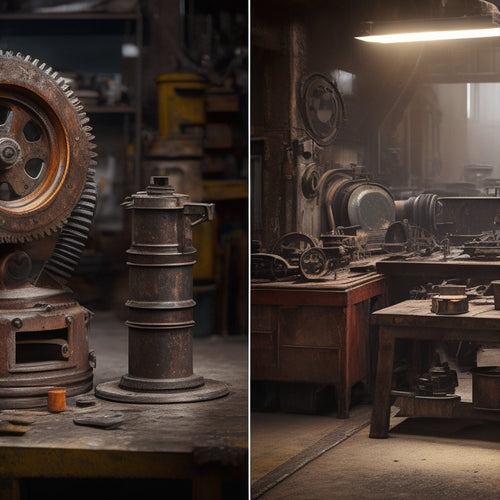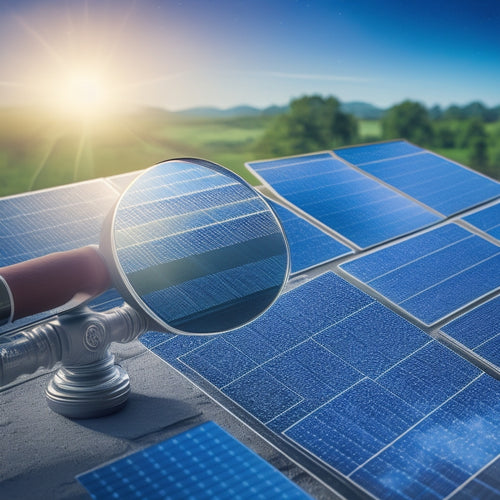
Why Regular Maintenance Matters for Your Panels
Share
You invested in solar panels to reduce your carbon footprint and save on energy costs. However, neglecting regular maintenance can reduce energy output by up to 25% and shorten your system's lifespan. Regular cleaning and inspections can boost energy efficiency by up to 21%. By maintaining your panels, you'll extend their lifespan, reduce repair and replacement costs, and guarantee peak performance. Regular maintenance is vital to preventing premature wear and tear, and it's necessary to learn more about the best practices to keep your system running smoothly - and that's just the beginning of what you'll discover.
Key Takeaways
• Regular maintenance increases energy output efficiency by up to 21% and reduces the carbon footprint.
• Cleaning and inspecting panels regularly prevents energy output reduction by up to 25% due to dirt and debris.
• Regular maintenance extends panel lifespan by preventing degradation from dust, dirt, extreme temperatures, and humidity.
• Proactive maintenance saves on repair and replacement costs by identifying and addressing potential issues early.
• Regular maintenance ensures system reliability, reduces downtime, and prevents premature wear and tear.
Boosts Energy Output Efficiency
Regular cleaning and inspection of your solar panels can increase their energy output efficiency by up to 21%, allowing you to generate more power from the same amount of sunlight. This boost in energy harvesting is essential, especially for those relying heavily on solar energy.
By removing dirt, grime, and debris, you're ensuring that your panels operate at maximum capacity. In fact, a study found that dirty panels can reduce energy output by as much as 25%. By keeping your panels clean, you're not only increasing energy output but also reducing your carbon footprint.
Regular inspections are also important for solar optimization. During these checks, experts can identify and address any potential issues, such as loose connections or damaged cells, which can hinder energy harvesting. By staying on top of maintenance, you'll be able to identify and fix problems before they escalate, ensuring your solar panels continue to operate at peak performance.
Extends Panel Lifespan Significantly
By keeping your solar panels clean and well-maintained, you can add years to their lifespan, potentially extending it by up to 10 years or more. Regular maintenance helps prevent panel degradation, which can occur due to environmental factors such as dust, dirt, and extreme weather conditions.
| Environmental Factor | Impact on Panels |
|---|---|
| Dust and Dirt | Reduces energy output, accelerates panel degradation |
| Extreme Temperatures | Affects panel performance, reduces lifespan |
| Humidity | Causes corrosion, reduces panel efficiency |
| UV Radiation | Accelerates panel degradation, reduces lifespan |
| Physical Damage | Cracks, breaks, and damage to panels, reducing lifespan |
Reduces Repair and Replacement
You'll save a great deal on repair and replacement costs by maintaining your solar panels, as neglect can lead to premature failures that necessitate costly fixes or even entire panel replacements. Regular maintenance is a preventive measure that helps you avoid these unnecessary expenses.
By identifying and addressing potential issues early on, you can prevent minor problems from escalating into major repairs. This proactive approach not only saves you money but also reduces downtime, ensuring your system operates at peak levels.
Additionally, maintaining your solar panels can also help extend your warranty. Many manufacturers offer extended warranties for systems that are properly maintained, giving you added peace of mind.
By staying on top of maintenance, you're more likely to catch potential issues before they become major problems, reducing the likelihood of costly repairs or replacements.
Increases System Reliability Factor
As a solar panel owner, maintaining your system regularly can greatly enhance its reliability factor, guaranteeing that it operates at peak levels even in harsh environmental conditions. When you neglect regular maintenance, you're more likely to experience system failure, which can lead to costly repairs and even complete system replacement.
By performing routine checks and maintenance tasks, you can identify and address potential issues before they escalate into major problems. This proactive approach ensures that your system operates at maximum efficiency, reducing the likelihood of unexpected downtime and lost energy production.
Regular maintenance also enables you to implement quality control measures, ensuring that your system meets the required standards and specifications. This includes inspecting your panels for signs of wear and tear, cleaning them to maintain efficient energy absorption, and verifying that all connections are secure.
Lowers Maintenance Cost Overrun
As you prioritize regular maintenance for your panels, you'll notice a significant reduction in downtime expenses, which can quickly add up and cut into your bottom line.
By extending the life of your equipment, you'll also avoid costly repairs and replacements, further minimizing maintenance cost overruns.
Reduced Downtime Expenses
Regular maintenance of your solar panels helps reduce downtime expenses by minimizing the likelihood of unexpected repairs, which in turn lowers maintenance cost overruns. By scheduling regular maintenance, you can identify and address potential issues before they become major problems, reducing the need for costly repairs. This approach allows you to plan for Scheduled Shutdowns, minimizing the impact on your operations.
A thorough Cost Analysis will help you understand the financial benefits of regular maintenance. By comparing the cost of maintenance to the cost of repairs, you'll see that investing in regular maintenance is a cost-effective strategy in the long run. Regular maintenance also helps you avoid the added expenses that come with extended downtime, such as lost productivity and revenue. By staying on top of maintenance, you can minimize these expenses and keep your operations running smoothly.
Extended Equipment Life
By consistently maintaining your solar panels, you can significantly extend their lifespan, which in turn reduces the likelihood of costly repairs and replacements, ultimately lowering maintenance cost overruns. This is essential, as it allows you to maximize your return on investment and guarantee sustainable operations. A well-maintained system can last up to 30 years or more, providing you with a steady flow of clean energy and significant long-term savings.
Regular maintenance also enables you to identify potential issues before they become major problems, reducing the need for costly equipment upgrades or replacements. By catching issues early, you can address them promptly, minimizing downtime and ensuring your system operates at peak levels. This proactive approach not only saves you money but also helps reduce your environmental footprint.
Enhances System Performance Ratio
Proper maintenance greatly enhances your solar panel system's performance ratio, allowing you to generate more power from the same amount of sunlight. This is important because even slight deviations from the best angle can have a notable impact on energy harvesting.
By ensuring your panels are clean, securely fastened, and free from debris, you'll maximize energy production. Regular maintenance also helps maintain the best angle, which is vital for capturing the sun's energy.
When your panels are at the ideal angle, energy harvesting increases, and you'll see a noticeable boost in your system's performance ratio. As a result, you'll enjoy lower electricity bills and a reduced carbon footprint.
Provides Early Fault Detection
When you regularly maintain your panels, you're able to catch potential issues before they escalate into major problems. This enables you to identify faults quickly, which in turn allows you to take proactive measures to prevent downtime.
Quick Identification of Issues
Implementing a proactive maintenance strategy is crucial for greatly reducing downtime and repair costs by detecting potential issues early. Quick identification of problems is key to preventing them from escalating into more serious issues that require costly repairs or replacement.
To achieve this, it's vital to incorporate:
-
Real-time monitoring: Keep a close eye on your panel's performance using real-time data to identify potential issues before they become major problems.
-
Visual inspections: Regularly inspect your panels to identify signs of wear and tear, corrosion, or other issues that may not be immediately apparent through monitoring alone.
-
Automated alerts: Set up automated alerts to notify you of any anomalies or issues, ensuring you're always one step ahead of potential problems.
Predictive Maintenance Enabled
By leveraging advanced analytics and machine learning algorithms, your panel maintenance strategy can detect potential faults before they occur, enabling proactive measures to prevent downtime and reduce repair costs.
This predictive maintenance approach empowers you to take control of your panel's performance, identifying potential issues before they become major problems.
With remote monitoring, you can track your panel's performance in real-time, receiving alerts and notifications when anomalies are detected.
Data analytics plays a vital role in this process, providing valuable insights into your panel's behavior and helping you pinpoint potential trouble spots.
By analyzing historical data and real-time performance metrics, you can identify patterns and trends that may indicate an impending fault.
This enables you to schedule maintenance during planned downtime, reducing the risk of unexpected outages and minimizing the impact on your operations.
Reduced Downtime Risks
Early fault detection enabled by predictive maintenance reduces downtime risks, allowing you to intervene promptly and prevent unexpected outages. This proactive approach guarantees that your system's reliability is maintained, and you can avoid costly repairs and lost productivity.
By detecting potential issues before they occur, you can schedule maintenance during planned downtime, minimizing the impact on your operations.
Here are some benefits of reduced downtime risks:
-
Improved system reliability: Predictive maintenance helps you identify and address potential issues before they affect your system's performance.
-
Enhanced risk assessment: By identifying potential faults early, you can assess the risks associated with them and prioritize maintenance efforts accordingly.
-
Reduced financial losses: By minimizing downtime, you can avoid lost productivity, reduced revenue, and costly repairs.
Supports Warranty Compliance Needs
Consistent maintenance of your solar panels guarantees that you meet the warranty requirements, preventing possible disputes or voidance of the warranty. By keeping a record of regular maintenance, you can confirm compliance with the manufacturer's warranty terms. This reduces the risk of disputes and ensures that you're protected in case anything goes wrong.
| Compliance Records | Warranty Validation | Benefits |
Regular cleaning schedules | Proof of maintenance dates | Avoids warranty disputes
Detailed inspection reports | Records of replaced parts | Confirms warranty validity
Maintenance logs with timestamps | Evidence of regular checks | Reduces risk of warranty voidance
Improves Overall System Durability
Regular maintenance of your solar panels is essential in order to identify and address potential issues before they escalate, thereby prolonging the lifespan of your system. By doing so, you're guaranteeing that your system remains resilient and durable, even in the face of harsh environmental conditions.
Regular maintenance is vital for maintaining the structural integrity of your solar panel system. This includes inspecting and cleaning the panels, checking for loose connections, and making sure that all components are securely fastened.
Some key benefits of regular maintenance include:
-
Extended System Lifespan: Regular maintenance helps prevent premature wear and tear, allowing your system to operate at peak performance for a longer period.
-
Improved System Resilience: By addressing potential issues promptly, you can ensure that your system can withstand extreme weather conditions and other external factors.
-
Reduced Downtime: Regular maintenance helps minimize the risk of unexpected shutdowns, ensuring that your system remains operational and generating power when you need it most.
Frequently Asked Questions
How Often Should I Clean My Solar Panels for Optimal Performance?
You should clean your solar panels every 6-12 months, depending on debris accumulation and environmental factors like dust, pollen, and water spots, to guarantee peak energy output and prolong their lifespan.
Can Regular Maintenance Void My Solar Panel Warranty?
'An ounce of prevention is worth a pound of cure.' When maintaining your solar panels, you wonder, can regular maintenance void your warranty? Check your warranty terms and manufacturer requirements to guarantee compliance, as non-adherence may invalidate your warranty.
What Is the Ideal Maintenance Schedule for My Solar Panel System?
You should schedule system checkups every 6-12 months, ensuring peak performance. Implement energy monitoring to track output, identifying potential issues before they escalate, and optimize your solar panel system's efficiency.
Do I Need to Perform Maintenance on My Solar Panels in Winter?
As winter's chill sets in, you're wise to wonder if your solar panels need TLC. Yes, you do need to perform winter maintenance, focusing on winterization tips and efficient snow removal to guarantee peak energy harvesting.
Can I Perform Solar Panel Maintenance Tasks on My Own Safely?
You can perform some solar panel maintenance tasks safely on your own, but make sure you wear personal protection gear, like gloves and safety glasses, and use proper safety equipment to avoid electrical shocks and falls.
Related Posts
-

Why Higher Upfront Costs Are Worth It
You pay a premium for high-quality, energy-efficient products, but they're worth it. With durability testing ensuring...
-

Solar Panel System Certification Costs: A 10-Point Breakdown
You're looking to understand the costs associated with solar panel system certification. Your total certification cos...
-

Safety First: Why Seniors Need Advanced Vehicle Features
As you get behind the wheel, you're likely unaware that seniors are 16% more likely to be involved in a fatal car cra...


